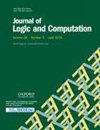将抽象辩证框架编码为高阶逻辑
IF 0.7
4区 数学
Q3 COMPUTER SCIENCE, THEORY & METHODS
引用次数: 0
摘要
本文提出了一种将抽象辩证框架及其语义编码为经典高阶逻辑的方法。重要的属性和语义关系使用证明助手 Isabelle/HOL 进行正式编码和证明。这种方法允许在统一逻辑环境中使用自动和交互式推理工具对抽象辩证框架进行计算机辅助分析。示例应用包括元理论属性的形式分析和验证,以及在特定语义约束下生成解释和扩展。本文章由计算机程序翻译,如有差异,请以英文原文为准。
An encoding of abstract dialectical frameworks into higher-order logic
An approach for encoding abstract dialectical frameworks and their semantics into classical higher-order logic is presented. Important properties and semantic relationships are formally encoded and proven using the proof assistant Isabelle/HOL. This approach allows for the computer-assisted analysis of abstract dialectical frameworks using automated and interactive reasoning tools within a uniform logic environment. Exemplary applications include the formal analysis and verification of meta-theoretical properties, and the generation of interpretations and extensions under specific semantic constraints.
求助全文
通过发布文献求助,成功后即可免费获取论文全文。
去求助
来源期刊

Journal of Logic and Computation
工程技术-计算机:理论方法
CiteScore
1.90
自引率
14.30%
发文量
82
审稿时长
6-12 weeks
期刊介绍:
Logic has found application in virtually all aspects of Information Technology, from software engineering and hardware to programming and artificial intelligence. Indeed, logic, artificial intelligence and theoretical computing are influencing each other to the extent that a new interdisciplinary area of Logic and Computation is emerging.
The Journal of Logic and Computation aims to promote the growth of logic and computing, including, among others, the following areas of interest: Logical Systems, such as classical and non-classical logic, constructive logic, categorical logic, modal logic, type theory, feasible maths.... Logical issues in logic programming, knowledge-based systems and automated reasoning; logical issues in knowledge representation, such as non-monotonic reasoning and systems of knowledge and belief; logics and semantics of programming; specification and verification of programs and systems; applications of logic in hardware and VLSI, natural language, concurrent computation, planning, and databases. The bulk of the content is technical scientific papers, although letters, reviews, and discussions, as well as relevant conference reviews, are included.
 求助内容:
求助内容: 应助结果提醒方式:
应助结果提醒方式:


